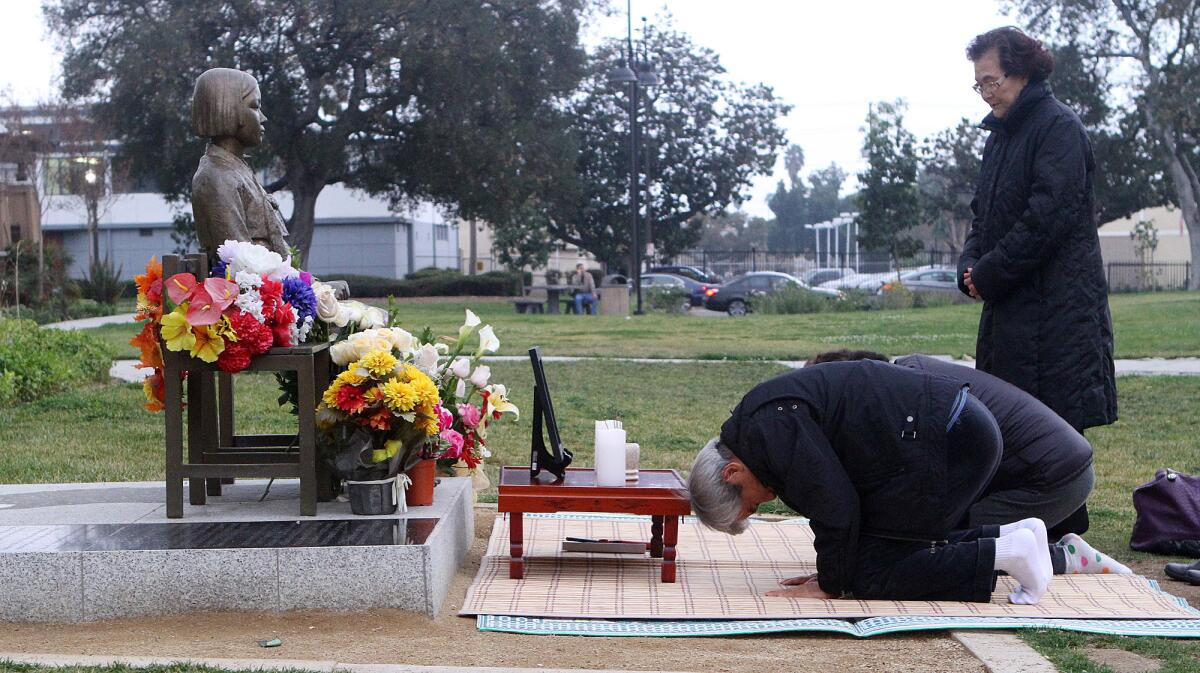A diplomatic call for comfort women

Rep. Adam Schiff urged the country’s top diplomat this week to press Japanese political leaders to formally recognize women used as sex slaves by the Imperial Army during World War II.
The Burbank Democrat, along with two of his Congressional colleagues, sent the letter to U.S. Secretary of State John Kerry, the same week as Korean supporters of a Glendale statue honoring so-called comfort women hosted an incense ceremony at the monument to honor a former victim who died last Saturday.
PHOTOS: Memorial ceremony for recently deceased comfort woman
“We recognize that this issue is deeply important to our constituents and should be a diplomatic priority for the Department of State,” he wrote, along with New Jersey Reps. Scott Garrett and Bill Pascrell.
All three have comfort-women memorials in their districts.
“Several of us feel that Japan can make a more full and consistent recognition of what happened to the comfort women,” Schiff said during a phone interview.
In 2007, Congress passed a resolution calling on the Japanese government to issue a formal apology to the comfort women. In the 1990s, a former Japanese prime minister sent letters of apology to former comfort women, but supporters say that wasn’t enough, pointing to a segment of Japanese people that continue to deny as many as 200,000 women were forced into prostitution by that country’s military.
The opposition persists despite the Ministry of Foreign Affairs in Japan declaring that some women were coerced and deprived of their freedom as well as numerous survivors publicly sharing harrowing tales of servitude.
Glendale has become ground zero for the comfort-women controversy since the city installed an 1,100-pound statue in Central Park in July. Since then, three delegations of Japanese politicians — both local and national — have visited Glendale and called on the city’s leaders to remove the memorial.
“Periodically there are very prominent Japanese public officials who make erroneous and hurtful comments about what was done to the comfort women,” Schiff said in the interview. “It’s clear that there really isn’t a full recognition and reckoning at times of what Japan did during World War II.”
The bronze monument in Glendale — the first comfort-women memorial on public land on the West Coast — features a young Korean woman sitting next to an empty chair. It is often surrounded by bouquets of flowers.
On Thursday afternoon, the Korean American Forum of California, which is advocating for the installation of similar statues throughout the United States, hosted an incense ceremony to honor a former comfort woman who died last week.
Hwang Keum-ja died at 89 on Saturday of lung and respiratory disease at a Seoul hospital. She was 13 years old and living in North Korea when she was taken by a Japanese policeman to work at a glass factory for three years, Phyllis Kim, spokeswoman for the Korean American Forum of California, said.
After that, Kim said, Hwang moved to China and was forced to work in a brothel. She returned to Korea at the end of World War II, but lived in poverty throughout her life.
Comfort-women advocates are lobbying to erect more memorials like the one in Glendale in an effort to prompt a formal parliamentary resolution in Japan apologizing to comfort women. Advocates fear that the longer it takes to pen the resolution, more former comfort women will die.
Schiff’s Jan. 29 letter was sent about two weeks after a Congressional appropriations bill including a provision that reflected sentiments similar to those expressed in his message, was signed into law.
Schiff said it was not uncommon for appropriators — in this case members of Congress — to express their views on what departments, such as the Department of State, should do with their funding.
As much as Kerry has his plate full with issues in the Middle East and elsewhere, Schiff said North Korea is also a top priority and Japan’s ability to work together with South Korea and the Philippines will be important for the United States strategically in Asia.
“A full recognition of what happened to the comfort women would improve those relations and that is very much in our interest,” Schiff said.
--
Follow Brittany Levine on Google+ and on Twitter: @brittanylevine.
ALSO:
Glendale pedestrian safety effort yields 28 citations
Manjra sentenced to 25 years to life for deaths of two women